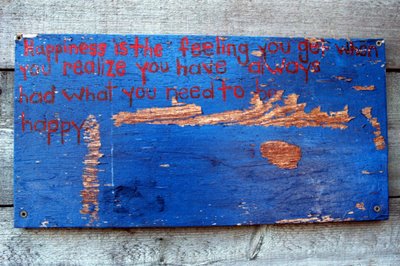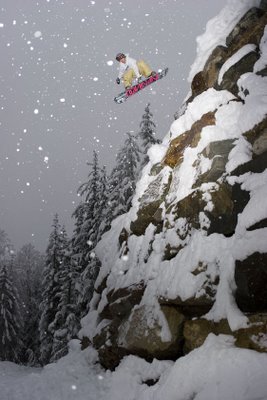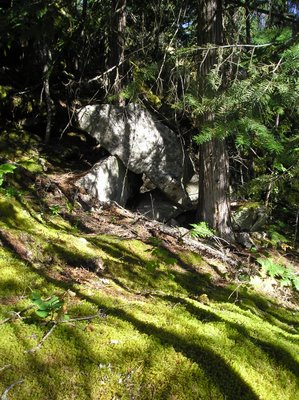Tuesday, August 29, 2006
Graffiti of the week

"Happiness is the feeling you get when you realize you have always had what you need to be happy".
Sunday, August 27, 2006
Newspaper column for this week...
LIVING WELL IS RISKY BUSINESS
It is a paradox that while we strive to reduce risk in our lives - many of us also seek the experience of putting ourselves at risk.
We live in a society inundated with risk aversion and caution. I pay for insurance for these things: health care, my teeth, a house, two vehicles, a business, our children and my life itself. Society protects us at every turn – seatbelts, bike helmets, no smoking by-laws, health inspections, immunizations, traffic signs and now… no lipstick on airplanes. It sometimes feels as though these boundaries and rules surround me like an unseen, yet tangible net.
Some suggest that one reaction to this complex web of protection may be an increase in thrill seeking behaviour. Unsafe sexual behaviour, abuse of drugs and alcohol, injury-prone extreme sports, foolish stunts (teenage boys come to mind) and travel to remote or dangerous destinations are all examples.
Another paradox around risk is that our perceptions and behaviour are often at odds with reality – we often worry about the wrong things. Psychologists tell us that our assessment of risk is increased if a situation or event is unfamiliar. People will estimate a situation as even more risky if it is one that produces a feeling of dread. Additionally, people are more likely to rate the risk as higher if the exposure to the situation is involuntary, and higher still if they feel they lack personal control over the events in question. The evening news comes to mind…
I might lie sleepless at night, worrying about Mad Cow Disease, West Nile Virus, youth crime and terrorists on the flights I take. If I were to worry based on evidence instead, I should think about driving my car safely to town or about gripping the handrail as I descend the stairs for coffee in the morning. Why? Because the most common causes of death from unintentional injury for most Canadians are motor vehicle crashes and falls.
How do we deal with these contradictions? There is a balance to be found in enjoying a full and free life, while also considering risk. Seek accurate information and be thoughtful about your actions. Parents should learn about what risks their children face and provide protection and guidance to them, appropriate to their age.
There are different approaches to finding the balance between caution and bold action.
Artist Vincent Van Gogh offered cautionary words, “Great things are not done by impulse but by a series of small things brought together.”
Encouraging bold action, writer Mark Twain advised, “Twenty years from now you will be more disappointed by the things you didn't do than by the ones you did do. So throw off the bowlines. Sail away from the safe harbor. Catch the trade winds in your sails. Explore. Dream. Discover.”
Finally, Confucius proposes the philosophical middle road, “Chi Wen Tzu always thought three times before taking action. Twice would have been quite enough.”
Wednesday, August 23, 2006
In the mood for a new season yet?
This is a photo of my nephew Rusty. He's a semi-pro snowboarder/film maker and sent me this last winter. I think it was taken near Whistler BC. I don't do things like this...I board the inner slopes of my mind instead (which can be exciting too, but probably safer).

Saturday, August 19, 2006
Darfur still simmering horribly...
 Much attention has rightfully gone to Lebanon and northern Israel in recent weeks, but let's not let our leaders forget that the so-called peace process in Sudan has not brought any sort of peace at all for the people in Darfur, and Sudanese refugees in Chad. Amnesty International is calling for a peacekeeping force with the mandate to protect people. This story elaborates. Excerpt below.
Much attention has rightfully gone to Lebanon and northern Israel in recent weeks, but let's not let our leaders forget that the so-called peace process in Sudan has not brought any sort of peace at all for the people in Darfur, and Sudanese refugees in Chad. Amnesty International is calling for a peacekeeping force with the mandate to protect people. This story elaborates. Excerpt below.'Once again the world at large is ignoring the conflict in Darfur, playing along with the charade that peace is in progress, when, in fact, nothing could be further from the truth,' said Kate Gilmore (AI Deputy Secretary General). 'There has been more conflict since the Darfur Peace Agreement was signed, not less, more displacements of people, not fewer, and more human rights violations perpetrated without any progress towards justice. And what's more, there now is a very real danger that this conflict, as it spills over the border, will continue to spread beyond Sudan.'
Tuesday, August 15, 2006
Some war...

- over a million Lebanese civilians displaced, many to return to destroyed homes and communities
- over 1,000 Lebanese dead, the majority civilians (of all political and religious backgrounds)
- over 3,500 seriously wounded
- Red Cross vehicles, UN outpost and hospitals deliberately targeted...
... in all the numbers above, UNICEF has been estimating about a third are children.
Oh, the major roads, bridges, power stations, docks, airports and other infrastructure - bombed to small pieces.
What was accomplished? Is Hezbollah gone and fnished? Seems like they're stronger than ever and now a majority of Lebanese people support them (from a small minority in June). Is there a peaceful settlement of the Palestinian State question? No. Are Israeli citizens (who also should not be targets) safe from future rocket or suicide bomb attacks? No.
Maybe it's time to try something else. Maybe it's time to elect a new US government. Maybe it's time to put money and political pressure into a solution for people rather than political posturing for leaders and states. Maybe it's time to stop state-sponsored violence when states simply name the enemy 'terrorists'. Maybe it's time for millions of us to hit the streets and scream.
Maybe it's time to give peace a chance.
Sunday, August 13, 2006
Hummingbirds again...


Toronto hosts HIV/Aids conference
Stephen Lewis, the UN Special Envoy for AIDS in Africa is a keynote speaker at the conference and an incredibly passionate advocate . Bill Gates and Bill Clinton will speak also. The Gates Foundation just announced a $500 million contribution to the Global Fund on HIV/AIDS.
Our compassionate Prime Minister, Stevie Harper, has decided he doesn't have time to attend. He's probably busy meeting with church groups to preach abstinence... or busy fighting crime or cutting daycare for poor families or taxes for rich people or scuttling the Kyoto Accord. What a busy twit he is...
Link
Saturday, August 12, 2006
Interesting graffiti
WATER WATER EVERYWHERE...
The first time this tepid glass of water was handed to me my health warning alarm bells began to clang. The water was a green colour – the hue of limeade. With sunlight shining through the small glass, I could see tiny bits floating in it - some appeared to be swimming. We were a seven hour rough drive to the nearest five hour flight to the nearest medical clinic. I looked at the gaunt, yet smiling faces of our hosts and wondered how to avoid downing this precious liquid.
Lucie saved me. She expressed with great feeling, “Oh, after such a long drive we were so looking forward to a glass of hot tea. Could you please take our water and boil it up for tea instead?” They did…and I dodged a probable water borne disease…that day at least.
I take it for granted that I won’t find green water and floaters in my tap water at home. I shouldn’t be so sure. There are more than 300 surface water systems in the British Columbia Interior Health region under boil water advisories, including mine. This means water protection workers have determined that water borne disease is a real risk in these systems.
Public Health instructions for drinking water under a boil advisory are straightforward. Boil the water for one minute (rolling boil) or disinfect the water by adding two drops of household bleach per litre and let it stand for twenty minutes. Otherwise use an alternate supply of water or commercially bottled water.
What is the rationale for a one minute rolling boil? Basically, boiling will inactivate or destroy pathogenic microbes that may be in contaminated water. The required temperature to accomplish this varies from 60 degrees Celsius for bacteria such as E. coli and Salmonella to 85 degrees Celsius to inactivate Norovirus (found in mollusks). Heating water until boiling is an easily recognized endpoint that doesn’t require the use of a thermometer.
Here’s some science. A rolling boil is when the little bubbles that form at the bottom of the pan break free and rise to break at the top – this is a true boil. And yes, water does boil at lower temperatures as altitude increases. At sea level it boils at 100 degrees Celsius. At 2,100 metres (7,000 feet) water boils at about 92 degrees Celsius. Since the highest communities in Canada fall below that altitude, the standard one minute boil will do its work across our land. If you happen to be scaling Mount Everest, you need to be more careful (about many things).
As for my drinking days in Sudan, it was under a glorious starry night sky, at the Camp David Café in the town of Nyala, when a pathogen found a comfortable home in me. I sipped water politely that evening and spent the next three days in a delirious haze – stumbling between bed, a bucket and the unpleasant outhouse behind our thatched roof home. My ordeal evolved to the above-noted five hour flight to Khartoum and a medical clinic. I was drugged enough to not soil the two-seater plane.
Remember, if in doubt, ask for the tea.
Tuesday, August 08, 2006
10th Annual Gentlemens Cruise A Palooza
Yes, there were martinis at 4:00 (shaken not stirred). There were also hikes, rock climbing, fishing, swimming, cards, rowing, windsurfing and very good and sometimes very tall stories... Remember gentlemen, "What is brought to the Cruise, stays on the Cruise."
Some pics (click to make larger):













